

Demystifying the Arab Spring. In Tunisia, protesters escalated calls for the restoration of the country's suspended constitution.
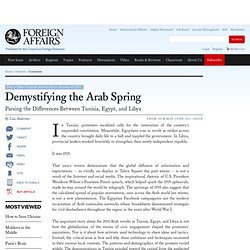
Meanwhile, Egyptians rose in revolt as strikes across the country brought daily life to a halt and toppled the government. In Libya, provincial leaders worked feverishly to strengthen their newly independent republic. It was 1919. That year's events demonstrate that the global diffusion of information and expectations -- so vividly on display in Tahrir Square this past winter -- is not a result of the Internet and social media. The inspirational rhetoric of U.S. Tunisia and the New Arab Media Space. An interesting discussion has already broken out over whether Tunisia should be considered a "Twitter Revolution" -- a far more interesting and relevant discussion than whether it was a "WikiLeaks Revolution" (it wasn't).
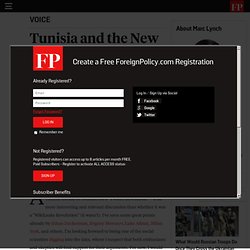
I've seen some great points already by Ethan Zuckerman, Evgeny Morozov, Luke Allnut, Jillian York, and others. I'm looking forward to being one of the social scientists digging into the data, where I suspect that both enthusiasts and skeptics will find support for their arguments. For now, I would just argue that it would be more productive to focus more broadly on the evolution of the Arab media over the last decade, in which new media such as Twitter, Facebook, YouTube, forums and blogs work together with satellite television stations such as Al Jazeera to collectively transform the Arab information environment and shatter the ability of authoritarian regimes to control the flow of information, images, ideas and opinions.
The "Street" and the Politics of Dissent in the Arab World. In the tense weeks between the September 11 attacks and the first US bombing raids over Afghanistan, and continuing until the fall of the Taliban, commentators raised serious concerns about what the Wall Street Journal later called the "irrational Arab street.
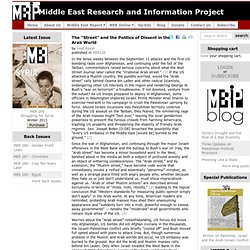
" [1] If the US attacked a Muslim country, the pundits worried, would the "Arab street" rally behind Osama bin Laden and other radical Islamists, endangering other US interests in the region and rendering George W. Bush's "war on terrorism" a troublesome, if not doomed, venture from the outset? As US troops prepared to deploy in Afghanistan, some officials in Washington implored Israeli Prime Minister Ariel Sharon to exercise restraint in his campaign to crush the Palestinian uprising by force.
A Sense of Place. Roy-23-3. The "Arab spring" in historical perspective. Top Ten Myths about the Arab Spring of 2011. Five myths about the Arab Spring. Obama set out to repair America’s relations with Syria and Iran, and gave George W.
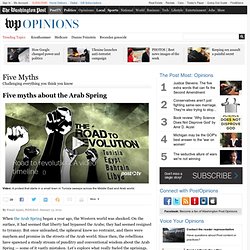
Bush’s “diplomacy of freedom” a quick burial. “Ideology . . . is so yesterday,” Secretary of State Hillary Rodham Clinton bluntly proclaimed in April 2009, identifying Bush’s assertive foreign policy as a thing of the past. But as upheaval swept through Iran in the first summer of the Obama presidency, the self-styled bearer of a new American diplomacy ducked for cover. The Arabs nearby were quick to see that Obama’s cosmopolitanism — the Kenyan father, the years in Indonesia — masked a political man focused on problems at home. The rebels in Tunisia and Egypt did not expect the U.S. cavalry to ride to the rescue. 2.
Facebook and Twitter enabled young dissidents to get around entrenched autocracies and communicate with one another. Mohammed Bouazizi, the young Tunisian street vendorwho set himself ablaze in December 2010, didn’t have a Facebook page. 3. 4. 5. Outlook@washpost.com Read more from Outlook: Mobilization and Collective Action in the Arab Spring. Anti-Liberal Netanyahu Slams Arab Spring as Anti-Liberal. Israeli Prime Minister Binyamin Netanyahu said yesterday that he had been right to oppose the forced resignation of Egyptian President Hosni Mubarak last February and categorized the uprisings in the Arab world as “anti-Western, anti-liberal, anti-Israeli and anti-democratic wave.”
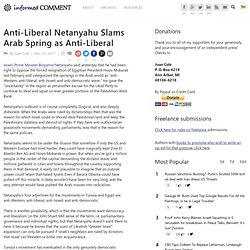
He gave the “uncertainty” in the region as yet another excuse for the Likud Party to continue to steal and squat on ever greater portions of the Palestinian West Bank. Netanyahu’s outburst is of course completely illogical, and also deeply dishonest. When the Arabs were ruled by dictatorships then that was the reason for which Israel could or should steal Palestinian land and keep the Palestinians stateless and devoid of rights.
If they have anti-authoritarian grassroots movements demanding parliaments, now that is the reason for the same policies. Netanyahu’s four adjectives for the movements in Tunisia and Egypt are anti-Western, anti-liberal, anti-Israeli and anti-democratic.